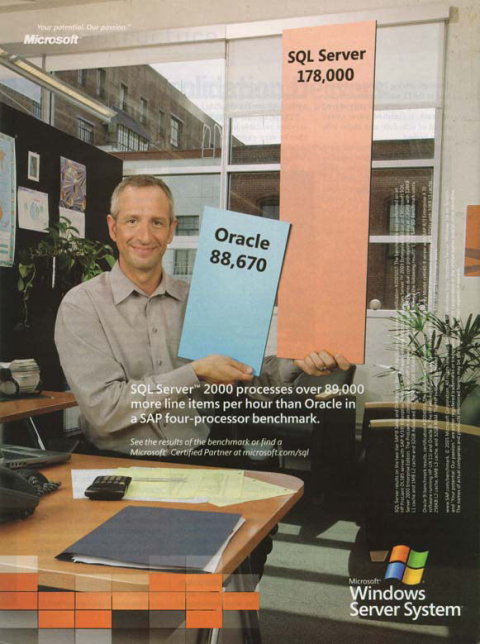08.23.13
Posted in GNU/Linux, Kernel, Novell at 8:41 pm by Dr. Roy Schestowitz

Photo by Sebastian Oliva
Summary: Linux is growing too fast, argues former Novell employee Greg Kroah-Hartman
Joe “Zonker” Brockmeier, the famous Novell employee (and SUSE leader for about a year), is moving to Red Hat [1] and his former colleague at Novell, Greg Kroah-Hartman, wants to slow Linux development down [2] with some consent from Linus Torvalds [3].
These developments are interesting because they help show what former Novell employees are up to. Nothing nefarious in this case, but it’s worth keeping an eye open. █
Related/contextual items from the news:
-
Joe “Zonker” Brockmeier was a regular name in Linux not so long ago. He first appeared on my radar writing for the different websites I visited. It seemed like he wrote for them all, even the ones I eventually began writing for myself. Later, he really solidified his hero status in my book by actually becoming a full-time Novell employee as community manager for openSUSE. But now, after a bit of a sabbatical, he’s traded in all his green t-shirts for red hats.
-
There were two updates for a stable Linux kernel yesterday. Is the process too fast? Linux Kernel developer Greg Kroah-Hartman has a plan to slow it down.
-
After problems with the last kernel, it seems there is a bit of a debate going on that Linux is coming out too fast and is not being properly tested.
The last release had a couple of significant bugs and had to be redone, something which Linux messiah Linus Torvalds agrees is not good enough. There are mutterings on the Linux blogs that versions are coming out too fast and without proper testing.
Permalink
 Send this to a friend
Send this to a friend
Posted in Microsoft, Steve Ballmer at 8:16 pm by Dr. Roy Schestowitz
So the Mafia don leaves without jail time as Mafia tactics are exposed even further

Summary: Interesting timing for Microsoft to announce the future departure of Ballmer, contributing to burial of massive news about Microsoft bribery in many countries around the world
FOLLOWING overwhelming unrest over Ballmer's decisions as CEO (including fraudulent financial reporting) this CEO — quite expectedly — is leaving, but the timing is interesting. As Simon Phipps, the head of the OSI, put it:
Ballmer to leave Microsoft
Honestly it’s about time and exactly what the company needs if it’s to get fixed. Let’s hope they get someone who will truly embrace open source rather than firewalling it and paying lip-service to it while secretly attacking it. That’s the change I have long said is needed to move beyond stage four of the journey.
The timing makes it sound like a potential decoy. Not only may Microsoft be facing multi-billion-dollar fines, but Ballmer himself may face jail time unless he flees and generates press buzz that hides the real news. What’s the real news? Microsoft’s sheer corruption again.
Ballmer is unlikely to be put in jail for racketeering and bribery because there is no justice, it’s a system that’s friendly to criminals who are allowed to get rich and never face consequences when caught (at worst a slap on their wrist). For a super-corrupt company like Microsoft (with track record to show it) that started its corruption under the leadership of Bill Gates it just makes sense to eliminate the old faces right now. And why? Well, some months ago we wrote about allegations of Microsoft bribery in China (a no-brainer, but this became a formal investigation, perhaps indicating the same is being done in the UK and elsewhere). There are bribes and gentle bribes and they are not unique to the Chinese market. Over the years we have covered many instances of Microsoft bribes, some of which qualify as “soft” or “gentle” bribes (like exchange of favours or deferred payments). Based on this explosive report, Microsoft is in the middle of a massive scandal that could land Ballmer in a jail cell. As one site put it:
Microsoft Corporation (NASDAQ:MSFT) bribe probe has now been linked to Russia and Pakistan, which indicates that the matter is actually not confined to just a few contracts but has a wider reach than was previously anticipated, according to a report from The Wall Street Journal.
Notice a trend among the Microsoft boosters (or staff), who try to use the groomed villain, Bill Gates, to somehow paint a gentle picture of Microsoft in light of the news, trying to focus on Ballmer leaving. Phipps posted the video to show what a monster this man can be, whereas Slashdot‘s Microsoft Nick (Nick Kolakowski) already did some whitewashing for this criminal, as usual [1, 2, 3, 4].
“The controversial executive will step down within the next 12 months,” says the booster, but where is his coverage of the latest crimes of Microsoft? None at all. Slashdot gave up on news coverage when it hired a Microsoft mole like this. Watch how he adds nonsense like “During Ballmer’s tenure, Microsoft also launched the highly successful Windows 7″ while adding the obligatory grooming of Bill Gates, which Microsoft Nick habitually does.
These boosters are like hyenas hanging around a bigger predator, hoping to get a bite of some prey leftovers (the predators are Gates and Microsoft, the hyenas smell money and stick close to it). Too bad they miss the real news, which is massive criminal activity. One wonders if Ballmer’s mere announcement of prospective departure was timed to distract the press from other, far more massive news. As we wrote 4 years ago, "Steve Ballmer Should Not be Fired, He Should be Arrested".█
Permalink
 Send this to a friend
Send this to a friend
Posted in Microsoft at 8:15 pm by Dr. Roy Schestowitz

Summary: Steven Sinofsky joins Silver Lake’s friends at Andreessen Horowitz and OpenLogic, which is run by a man from Microsoft, joins the Rogue Wave
When Microsoft destroyed Nokia we were not shocked because, given Elop’s history before Microsoft, we predicted Elop would be trouble wherever he lands since the moment he left Microsoft (well before joining Nokia, making it a vassal of Microsoft). A lot of those who depart from Microsoft proceed to polluting other organisations (public or private).
Sinofsky, who is no longer at Microsoft, has just joined a venture capital firm which is close to Silver Lake, the Microsoft proxy we have criticised a lot. It helps Microsoft abduct companies.
Speaking of abduction, the company run by a Microsoft veteran to distort FOSS (mostly by twisting facts) has just been taken over by Rogue Wave (aptly named). To quote the press release:
Rogue Wave Software announced today that it has acquired OpenLogic, Inc., the leading provider of cloud-based open source software management solutions, support, and consulting. Broomfield, Colorado-based OpenLogic offers a platform, OpenLogic Exchange(OLEX), which enables software development teams to leverage the breadth and innovation of open source software.
Microsoft does not always need to infiltrate entities in order to influence them. When it comes to the NSA, for example, Microsoft just bends over by selling out its customers in exchange for government favours. More on government favours in the next post… █
Permalink
 Send this to a friend
Send this to a friend
Posted in Site News at 11:28 am by Dr. Roy Schestowitz

Summary: Great Britain follows the United States’ lead in the war on investigative journalism
The UK is generally renowned for fairly balanced coverage, even in state-sponsored TV. I don’t share such an opinion (in fact, over a decade ago I stopped watching TV), but seeing how terrible the equivalents in other countries can be, I don’t spend so much time chastising the British press. The corporate press here is not as bad as it can get, although Thatcher turned even the BBC into something more like corporate press; it just happens to be subsidised by taxpayers. Yes, people pay to be indoctrinated, but this is not how it was originally intended to be. There is nothing about broadcast which legally binds it to truth, so a lot of films and programmes spread fiction provided there is an audience and advertisers for it. The entire apparatus is market-driven, where the “market” can extend to be nefarious entities. If it is profitable, irrespective of whether it is honest, ethical or accurate, then it is likely to be deemed “successful”.
“We are becoming no better than the US army and police, which became notorious for silencing those who report corruption and war crimes.”My wife and I had a discussion this month about how the UK is relatively protective of journalism. Compared to countries like Russia and today’s United States (which fights real journalism), the UK seemed safe, putting aside libel laws and other notorious impediments to free speech. It is rare for journalists to be killed in the UK over their reporting (see [1] for a likely new example in the US, where political culture is more aggressive [2]).
We are going through a difficult period of time as two new incidents show that press freedom in the UK is being severely impeded (apparently on behalf of the new empire in this case, based on reports which claim collusion with the White House). One is detainment of a journalist’s partner using laws that got passed under the guise of “combating terrorism” [3] and another is destruction of hardware used by reporters in their own news organisation. What needs to happen right now is public backlash, but polls in the UK (OpenGov) show indifference and even support for the crushing of journalists. In both cases the reporting focused on state secrets which revealed violations of the law. What this means is, essentially, UK law enforcement staff essentially protect those who break the law by breaking the law and harassing those who legally covered the crimes of those breaking the law. In other words, UK police is not defending the law here; it is breaking the law to stop the press from reporting on those who break the law. We are becoming no better than the US army and police, which became notorious for silencing those who report corruption and war crimes.
Any society is bound to become even more corrupt over time if there is no oversight. The press is one form of oversight, informing regulators and also informing the public. If the UK does not leave journalists alone to do their work, then the descend to increased corruption will be steeper and there will be nobody left to fight it. █
Picks from the news:
-
According to the LA Weekly, reporter Michael Hastings asked to borrow a friend’s car shortly before his death
-
Three drones are deployed to cover the length of the Texas border and are routinely used by law enforcement.
-
Writing in today’s Guardian, Lord Falconer, the former Lord Chancellor who helped introduce the Terrorism Act 2000, has laid bare the increasingly clear case that the police acted unlawfully in detaining David Miranda under Schedule 7 of the Terrorism Act 2000.
“The Terrorism Act defines a terrorist as someone “involved in committing preparing or instigating acts of terrorism”. Miranda is plainly not committing or preparing acts of terrorism.”
At stake is not only a procedural check but the fundamental principle of the rule of law – namely, that the state will not use powers granted to it for reasons the democratically elected legislature has not permitted.
Permalink
 Send this to a friend
Send this to a friend
Posted in GNOME, Google at 11:22 am by Dr. Roy Schestowitz

Summary: The real danger that the leading Linux-based operating system (Android) will cease to be free/libre
Autonomy of a nation depends on various factors which need to be pursued and assured. If your country is under the surveillance of another, then it is being controlled — determination-wise — by another. If the surveillance is bi-directional, as in the case of Russia and the United States for example, then neither country is in charge of another. Here in the UK we have at least two NSA bases (the ones we know about), whereas Britain has no army or surveillance bases in the US. It helps show who is in control. Today I travelled to Yorkshire, where protesters habitually go to an NSA base where they denounce US imperialism.
This rule extends to software. If the programmer can watch the user but the user cannot see the programmer or even the program’s code, then the user is essentially occupied. He or she has no control and the possibility of self determination is lowered. Espionage makes it possible for the software owner to weaken the user. Think how Google would cope if its infrastructure was Windows-based. It is not just a matter of immediate monetary cost. The hidden costs are rarely taken into account, but they matter.
Earlier this month Google and Qualcomm found themselves in hot water following a public resignation over the closing of Android. Google has since then retracted an apparent decision to go along with Qualcomm, but there is still no assurance that source code will be free in the future. This is a serious cause for concern.
Back in the days it seemed inevitable that one Linux-based platform or another would dominate the mobile world [1] and even expand to desktops [2]. It was hard to tell which one because several multi-vendor alliances were created, decoupled, merged, etc. Some platforms, like WebOS for instance, were proprietary (except the kernel, Linux). Some had GNU, some did not [3,4]. Some were Web-oriented, whereas others encouraged development of native applications. Google clearly won this race and is, for now, the market leader. Almost a dozen other Linux-based platforms are still contenders and all of them are now Free software (or claim to be, even if source code is not yet publicly available).
Earlier this week there was a discussion on the Web about whether or not Android qualifies as a “Linux distro” (can’t add “GNU” in this case). Some said that proprietary programs on Android disqualify it. Whatever the case is, Android itself — the platform — is Free software in a very weird, Google-like sense. Like other FOSS projects from Google, development is done privately and code released periodically. If new versions of Android can be ‘leaked’, then we know development is not quite so open to the community (non-OHA parties).
The final point to be made here is that in order to empower users and developers now that Android is a universal platform (or rapidly getting there) we should keep pressure on Google to keep Android free/libre. The wider the usage of Android, the smaller the proportion of users who care about freedom will get. Then, Google will be able to reason about de-emphasising FOSS and community participation in the same way canonical did. Currently, the only reason Android is somewhat respectful of some technology rights like privacy is that its free nature permits derivatives like Replicant to compete on key terms and compel OHA partners to catch up. If Android was ever to shut out ‘foreign’ developers, then we would expect Android to become more user-hostile and therein lies a principal argument for software freedom. If malicious features can be removed, one developer or another will make sure they do get removed. This limits what companies like Google can get away with.
Free software is not about price or even about enabling every single user to modify his or her software. Software freedom helps us assure that competition acts as a regulator against malicious features. The less free/libre the software is, the more menacing the software will become over time. Just watch what Vista did with DRM and Vista 8 does with restricted boot and other malicious ‘features’ which treat the user like an enemy. █
From the news:
-
Google and Apple currently enjoy a virtual duopoly in the worldwide smartphone market, with Android and iOS commanding 79 percent and 14.2 percent of sales respectively, according to Gartner.
Their nearest challenger is Windows Phone with 3.3 percent and BlackBerry is back further still, but such dominance has not been enough to dissuade four new mobile operating systems from believing they can upset the market leaders.
-
China-based Ugoos announced a quad-core, HDMI-stick style mini-PC available for a special price of $65 (normally $100). The Ugoos UM2 runs Android 4.2 on a quad-core Rockchip RK3188 ARM Cortex-A9 SoC, offers an HDMI port, WiFi, and Bluetooth 4.0, and provides dual USB 2.0 host ports for external peripheral connection.
-
Jolla, the Finnish startup comprised of ex-Nokians that’s building its own MeeGo-based smartphone platform and phone hardware has closed out a pre-sales campaign for the device it showed off in May. Thing is, it’s not saying how many phones are in this first pre-order batch — so it’s not really saying very much about the level of demand it’s seeing (or not seeing).
-
The open source Tizen operating system could be your next mobile device experience.
Permalink
 Send this to a friend
Send this to a friend
08.22.13
Posted in Site News at 10:15 am by Dr. Roy Schestowitz
Sun sets on the old Techrights

Summary: Experimenting with a new format that accommodates more posts and possibly making this new format permanent
The daily links have been expanding in terms of scope over the years and a lot of items did not get as much attention as they deserved. Starting next month (after our summer vacation) I will finally make the changes that I inquired about over the past year or two. Techrights will expand its scope of coverage to make up for the vacuum left by closure of some important sites. There will be focus on external references and the old topics will still take priority. I will experiment with the new format over the coming week and if it’s reasonably useful to readers, then this will be the way forward.
In order to understand this new format it is essential that I explain how I do my research. I am subscribed to hundreds of feeds, some of which are multi-site aggregators. I read through them and then organise them, later to decide what I have time to write about. What I cannot afford to cover given time limitations I will typically add to the next bunch of daily links. A lot of journalists work in the same way, give or take a step.
Daily links give no convenient opportunity to add a personal interpretation or tie together items other than by vicinity or chronology. It would be more valuable to split what is currently just a compilation of daily links and instead publish analysis which deals not only with FOSS but other subjects too. This will increase the amount of output and make it easier to navigate through news (by headlines, dates, and so on). In essence, there will be long articles for topics which are important and shorter ones with links appended where the topic merits lesser attention.
It is hard to say how this will scale w.r.t. time, hence I will give it a trial period of less one week and then decide if it’s sustainable.
On another final note, there is no denying that there is less FOSS news coverage than there used to be. It does not mean that FOSS has become irrelevant; it is just being taken for granted and increasingly — like IBM — it becomes a quiet giant (few cover the Linux and FOSS aspects of Android for example). What’s increasingly needed right now is advocacy that expands/ties software freedom to justice and rights like privacy. Not many sites connect those different strands; even fewer do so after Groklaw ceased publication. Later this year this site will turn seven, so now is a good time to readjust format, maybe the layout too (at a later stage). █
Permalink
 Send this to a friend
Send this to a friend
Posted in Europe, Microsoft, Vista 8, Windows at 10:04 am by Dr. Roy Schestowitz
Blowback time

Angela Merkel, by Αντώνης Σαμαράς Πρωθυπουργός της Ελλάδας
Summary: The NSA is getting US corporations (subsidised by US taxpayers to an extent) banned for security reasons, showing in the process how proprietary paradigm helps conceal back doors and reduce trust
Angela Merkel has been working with the NSA, Microsoft’s close ally, for quite some time. But right now this relationship is exploding right in her face and jeopardises her election campaign in Germany (voting is imminent). She needs to rethink her policies in light of the NSA abuses which everyone now knows about.
The NSA has been involved in Vista 8 development (as usual, the same was done with previous versions of Windows) and it gets notified of back doors in the operating system (while they are universally unaddressed). Add UEFI to the equation and the NSA can now remotely brick some motherboards as long as they run Windows. The British military does not seem to mind this. It gave the US control of all PCs. National Security in the UK assumes that by “national” we mean the US. We already have some NSA bases in the UK.
Nations are finally grasping the threat of the NSA. First China and Russia took action, with China launching a large probe and Russia abandoning some computers. Well, now Germany joins the pack. As David Sugar said it to me, “Windows 8 banned by German govt for integrating forced hardware surveillance & backdoors”
They also warned against UEFI (for secure boot) less than a year ago. Here is the a summary of a report written in German:
According to leaked internal documents from the German Federal Office for Information Security (BSI) that Die Zeit obtained, IT experts figured out that Windows 8, the touch-screen enabled, super-duper, but sales-challenged Microsoft operating system is outright dangerous for data security. It allows Microsoft to control the computer remotely through a built-in backdoor. Keys to that backdoor are likely accessible to the NSA – and in an unintended ironic twist, perhaps even to the Chinese.
The backdoor is called “Trusted Computing,” developed and promoted by the Trusted Computing Group, founded a decade ago by the all-American tech companies AMD, Cisco, Hewlett-Packard, IBM, Intel, Microsoft, and Wave Systems. Its core element is a chip, the Trusted Platform Module (TPM), and an operating system designed for it, such as Windows 8. Trusted Computing Group has developed the specifications of how the chip and operating systems work together.
The other day, unofficial Microsoft spokeswoman Mary Jo Foley (her criticisms of Microsoft are rare and weak) was pushing people to buy new software from Microsoft, citing security reasons. [via]
Microsoft’s latest tack in trying to wean users off Windows XP is to warn them of a possible ‘zero day forever’ scenario in the post-April 2014 support cut-off world.
This is nonsense because after the NSA leaks we know that this threat is perpetual. As Pogson put it:
Well, I don’t think those numbers are very accurate but it’s the trend that matters. There are still hundreds of millions of PCs out there using XP and after 234 days there will still be ~200 million clinging to what they know. According to M$, XP will be revealed as the garbage OS that it is after that because it will be a huge unprotected target for malware artists. They shipped it with ~50K bugs and added more over the years. Malware artists have been discovering hundreds of ways of penetrating the OS every day for more than a decade. XP inspired whole industies of “anti-malware” and malware, spending the resources of IT defending IT from the carelessness of M$ for security, integrity and performance. M$ has used hundreds of millions of users and owners of PCs as slaves all these years and many have accepted that slavery as a way of life.
Pogson’s point is valid. But he does not address the fact that flaws are being spread to partners (like Microsoft does with the NSA). An article from the British press says that “Microsoft warns it’ll hand out zero days for Windows XP” (like it has done for a dozen years with the NSA). To quote:
Microsoft has a Windows XP problem: people still like it and aren’t willing to upgrade just yet. So it’s warning users that if they don’t upgrade soon, each new Patch Tuesday will gift a new series of vulnerabilities to the hacking community.
Windows XP is already Swiss cheese. Microsoft is trying to exploit its rubbish security as a marketing tool right now. It wants to upsell.
Woody Leonhard, an author of IDG, wrote about 17 epic Microsoft Windows Auto Update meltdowns [via], preceding it with:
These legendary clunkers made Patch Tuesday a living hell for Windows users the world over
A lot of the press has been overlooking an important point. The Windows toggle button which tells Microsoft not to automatically update (modify) the system has no effect. We know this empirically, at least when it comes to XP; about 5 years ago it was shown to have no effect. Automatic update is a back door, so Microsoft would let the NSA take over PCs with this back door, too. Staying “up to date” with patches can thus have the opposite effect.
The bottom line is, any company that comes in contact with the Department of Espionage (the NSA) should be suspect and should be avoided where possible. Germany should do nationally what it already did in Munich and a few smaller places, █
Permalink
 Send this to a friend
Send this to a friend
Posted in Deception, Microsoft, Vista 8, Windows at 9:34 am by Dr. Roy Schestowitz
Benchmark frauds

Summary: Vista 8 found to be rigging benchmark results and subsequently banned
Over the years we have covered numerous instances where Microsoft falsified data and methods to defame the competition [1, 2]. Microsoft lies with numbers the same way the NSA does. Now we find that Microsoft is apparently rigging benchmarks that involve Vista 8, the worst version of Windows ever (worse than Vista based on market performance). The world’s top benchmarking site caught and banned it:
In an odd turn of events, Windows 8 has been banned from HWBot, one of the world’s top benchmarking and overclocking communities. All existing benchmarks recorded by Windows 8 have been disqualified. This is due to a fault in Windows 8′s real-time clock (RTC), which all benchmarking tools use as a baseline.
[...]
Moving forward, HWBot simply says that it’s “impossible to verify the veracity of a system performance” under Windows 8, and thus benchmarks performed under Windows 8 will no longer be accepted. The blog post also says that all previous Windows 8-based records will be disqualified, though some comments from the moderator suggest that they’re still deciding if this is the best course of action. The moderator also says they don’t think that this flaw in the Windows 8 RTC is being actively exploited, but it’s obviously a case of better-safe-than-sorry.
For Microsoft’s part, this issue can probably be fixed with a patch, though it might be difficult given Windows 8′s cross-platform nature. It will be interesting to see how quickly Microsoft responds, because benchmarking tools really have no recourse without an accurate RTC. Having an entire operating system outlawed from one of the world’s biggest benchmarking sites is a big deal. For now, PC enthusiasts have yet another reason to stick with Windows 7.
Microsoft will probably say it’s just an accident and we’ll be expected to just give it the benefit of the doubt, despite Microsoft’s long history of fraudulent benchmarks. Did Microsoft have the same properties in previous versions of Windows but was never caught? It’s worth verifying. █
Permalink
 Send this to a friend
Send this to a friend
« Previous Page — « Previous entries « Previous Page · Next Page » Next entries » — Next Page »
























 Content is available under CC-BY-SA
Content is available under CC-BY-SA